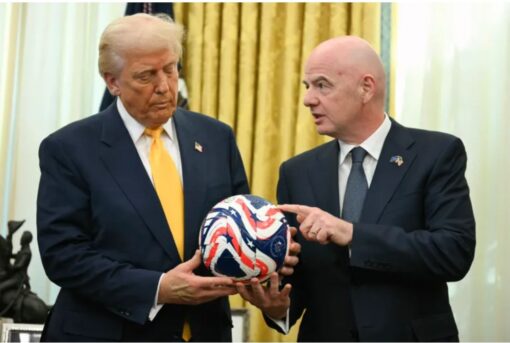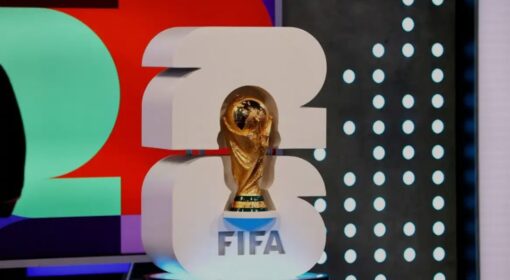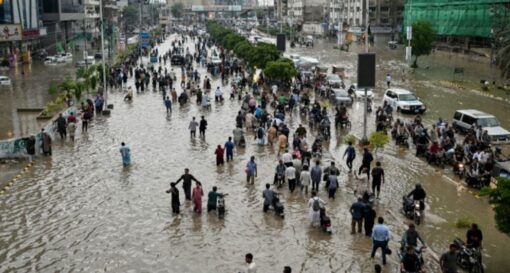The United States government has stepped firmly into the growing controversy surrounding calls to exclude Israel from the 2026 FIFA World Cup, pledging that it will do everything within its power to prevent the imposition of sanctions on the Israeli national football team.
The announcement comes as European football officials prepare for a decisive vote that could determine whether Israel remains part of the global tournament. Pressure has mounted significantly after the United Nations issued a damning report last week, concluding that Israel is engaged in acts of genocide against Palestinians in Gaza.
The report has amplified global calls for accountability and intensified debate over whether Israel should be permitted to participate in international sporting events.
In Washington, a State Department spokesperson declared that the US would “absolutely work to fully stop any effort to attempt to ban Israel’s national football team from the World Cup.”
The firm statement highlights the political weight the issue has taken on, especially with the United States hosting the majority of the tournament matches across stadiums in America, Canada, and Mexico.

With President Donald Trump openly supportive of the tournament and a staunch ally of Israel, the political and diplomatic dimensions of football governance have become entangled with broader international disputes over human rights, justice, and accountability.
Within European football, however, the mood is shifting. UEFA, the governing body for the sport in Europe, is reportedly preparing to call an emergency vote in the coming days on whether to suspend Israel from its competitions.
Reports indicate that a majority of its 20-member executive committee now favors a ban, driven by concerns that the treatment of Israel compared with Russia has exposed double standards in international football governance.
Russia was swiftly suspended by both UEFA and FIFA in 2022 following its invasion of Ukraine, a precedent that critics argue should now apply to Israel given the UN’s findings of genocide and the mounting allegations of war crimes. For many, continuing to allow Israel to compete would represent hypocrisy in the sport’s response to state violence.
The call for sanctions has grown louder across Europe. Spanish Prime Minister Pedro Sanchez recently insisted that Israel should face the same sporting isolation as Russia, declaring that “until the barbarity ends, neither Russia nor Israel should be in any international competition.”
His statement reflects not only mounting frustration in European capitals but also the view that football, as the world’s most watched sport, cannot remain insulated from the realities of war and atrocities.
Other governments in the region have begun signaling their openness to sanctions as well, making next week’s UEFA vote a critical juncture.
While UEFA has authority over European competitions, it does not control World Cup qualifiers, which fall under FIFA’s jurisdiction.
FIFA President Gianni Infantino, who maintains a close personal relationship with Trump and has spent recent days at FIFA’s New York offices located in Trump Tower, is widely expected to resist any effort to exclude Israel.
With the United States as the main host nation for the 2026 tournament, FIFA’s willingness to act against Washington’s stance is uncertain. This tension sets the stage for a possible clash between European football officials pushing for a ban and FIFA leadership aligned with political allies in Washington.
The Palestinian Football Association has been vocal in its appeal for sporting sanctions, with its president Jibril Rajoub arguing that Israel’s actions have violated FIFA’s principles and values.
He told broadcasters in Europe that Israel’s conduct merited suspension and that both UEFA and FIFA had a responsibility to take action. For Palestinians, the demand goes beyond football—it represents an opportunity to apply meaningful pressure on Israel in a global arena where accountability has been elusive.
Supporters of a ban argue that football sanctions, while symbolic, could be a powerful signal of global condemnation.
Israel has responded with an intensive lobbying campaign. Its sports and culture minister Miki Zohar, Prime Minister Benjamin Netanyahu, and the president of its football association Moshe Zuares are all reportedly engaged in efforts to keep Israel in the competition.
For them, exclusion from the World Cup would not only be a diplomatic setback but also a deep blow to national pride and legitimacy at a time when the country faces unprecedented levels of international isolation.
Netanyahu himself has warned Israelis that the country must prepare for a more self-sufficient economy in light of growing isolation, and sporting sanctions would mark a further escalation of that trajectory.
The debate over Israel’s place in international football highlights broader questions about the relationship between sport and politics. While governing bodies like FIFA have long insisted that football should remain above politics, reality has repeatedly undermined this claim.
From apartheid South Africa to Russia’s suspension, international football has often been used as a vehicle for political accountability.
Advocates of banning Israel argue that allowing the team to compete as normal while accusations of genocide are investigated undermines the credibility of the sport itself.
The United States, however, views the campaign to isolate Israel as a direct challenge to its foreign policy priorities. Hosting the World Cup is a centerpiece of Trump’s diplomatic and domestic agenda, and ensuring Israel’s participation aligns with his efforts to project loyalty to his closest ally in the Middle East.

His administration’s open alignment with FIFA leadership strengthens the perception that politics will weigh heavily on football’s ultimate decision. Washington’s intervention also signals to European capitals that pushing forward with sanctions will come at the cost of friction with the tournament’s host nation.
As the deadline approaches, the outcome remains uncertain. UEFA’s vote could suspend Israel from European competitions, effectively blocking its path to qualification.
Yet even if UEFA acts, FIFA may attempt to resist enforcing a broader exclusion, citing jurisdictional limits and the political sensitivities of the host nation. If this happens, football could face a fracture between Europe and the sport’s global body, further complicating preparations for the World Cup.
What is certain is that the pressure on Israel, both diplomatic and sporting, is intensifying. With the world’s eyes fixed on the most prestigious football tournament, decisions made in the coming weeks could define not only Israel’s participation but also football’s stance on human rights and accountability in the twenty-first century.


